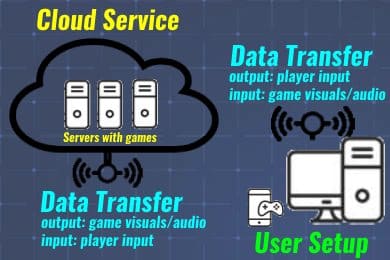Cloud gaming is a catch-all phrase for the growing number of services that let you stream games over the internet instead of buying and installing them on your PC or console.
You may have heard the term “Netflix for games” to describe cloud gaming because the principle is similar.
Instead of installing games on your computer, you stream video game content to your computer over the internet.
There are immediate benefits to this kind of setup: hardware-demanding games can run on an older machine and it reduces storage requirements by storing games remotely.
The trade-offs though: You need reliable internet access to play games over the cloud, and streaming performance can be unpredictable if your connection isn’t up to the task. If you’re using a subscription service you don’t actually own the game, so if it disappears from the service you’re out of luck.

In this article, we go into more about cloud gaming and what it means!
What Does Cloud Gaming Actually Mean?
When we talk about cloud gaming, we’re referring to a model in which a game’s assets and code are run remotely, either on a rented server or a virtual machine in a data center. The user’s device is responsible for generating the controls and video output appropriate for their chosen input method.
This has a couple of advantages over the typical local gaming setup, which runs all the software for the game directly on a user’s device and sends video and audio data back to the user’s display and speakers.
In a cloud gaming system, the user’s device is responsible only for receiving that video and audio and displaying it on their screen. This means an old computer can run the latest games at the max. settings as the server are actually running the game.
The Benefits of Cloud Gaming
The biggest advantage of cloud gaming is not requiring to have the latest hardware to run the newest games. Old computers are able to stream demanding games at the highest quality – provided the hard running the game is capable of it. Additionally, it reduces storage requirements on your device as the game is not actually installed on your computer.
The benefit also extends into all you need a display, an input device, and an internet connection. Imagine playing your favorite game on your phone! I wouldn’t mind playing GTA 5, max settings, while on my lunch break!
The Drawbacks of Cloud Gaming
To understand the drawbacks of cloud gaming, it helps to consider the most common model for a cloud gaming service: A company runs a huge number of servers in a data center, each of which is running a virtualized version of a customer’s game. Some games are rendered in real-time, while others are saved as a series of frames, much like the difference between a live sports broadcast.
The problem is that the data center isn’t really your device — it’s a server on the other side of the internet.
The data that travels between you and the service can slow. Games that require quick reactions and input would have a noticeable difference in both display and input and may not be able to be played competitively at higher levels.
Furthermore, unless you have access to the installation directory of the game, adding mods may not be possible!
Another drawback could come in the form of subscription services where you subscribe to a cloud gaming service. This is another monthly cost and you won’t actually own the game if you choose to stop your subscription.
How Does Cloud Gaming Actually Work?
There are two basic ways that a cloud gaming service can work: Dedicated hardware or a virtual machine.

Dedicated Hardware
Dedicated hardware is the old-school way that streaming services work, where you rent a node on a remote server and install a streaming client on it to render your game locally.
The big advantage to this setup is that there’s very little latency and you can play at the highest visual fidelity normally available on your system. The disadvantage is you have to pay for a dedicated machine and bandwidth to connect to it, which can get expensive.
Virtual Machine
The more common solution today is to use a virtual machine. In this model, the company hosts a virtualized version of your operating system and game and streams that to your device.
This lets them support a wide range of devices at a low cost, but it means you’re running the game on their hardware, which can add significant latency.
Summary
Cloud gaming has a lot of potentials to allow gamers the ability to play demanding games on any device from any location. Whether you create your own cloud gaming experience with your PC or explore cloud gaming options, it’s still in its early phases and its full potential is still to come.
The drawbacks can be daunting though. Monthly subscription fees, not owning the game, high latency, and potentially not being able to mod games are enough to push away many people.
Those issues aside, cloud gaming is a promising technology. It lets us play games on a wider range of devices, the trade-offs are real, but they can be worth it. What do you think the future is for cloud gaming? Let us know in Discord!
